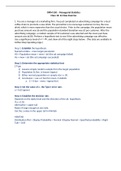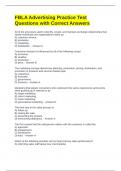Substantive rights and state responses (IHRL) 29/04/22
Nation law is based on consent – state must consent for a law to become a part of the state.
Hard law – pressuring someone to achieve the change you want – can be debated that hard law
doesn’t always work because people can still go against what is wanted
Soft law – recommendation/persuasion to achieve a certain change – can change into hard law later
Sovereignty
- Westphalian sovereignty
o Each state has sovereignty over its territory and domestic affairs to the exclusion of
external powers.
o Each state – no matter its size is recognised in international law
o Principle of non-interference
- Modern sovereignty
o Shared exercise of public power
o Right to conduct own affairs
o Power to make own laws
o Right to defend its own people
o Territorial integrity
o Recognition by the UN
o non-intervention
the bigger the state, the more caution you must take when joining unions
etc.
- Derogations
o Permits states to limit their responsibility to certain human rights for a short period
of time due to extreme emergency situations
o Means that at this point human rights law don’t apply to maintain peace and
security
o It is used in public emergences or armed conflicts
o It must be used in absolute necessity to achieve a goal
o E.g., Boston attack – marshal law put in place, whole city closed, and derogation was
put in place
o Haiti – derogation in place to deal with tsunami
o Each human rights instrument has its own internal rules about derogation and if a
state can derogate from rights.
- Non – derogable rights (most important rights)
o Some rights cannot be derogated from
Right to life
Freedom from torture
Freedom from slavery, thought, conscience and religion
o This creates a hierarchy of rights – the most important human rights cannot be
compromised – e.g., right to life
Nation law is based on consent – state must consent for a law to become a part of the state.
Hard law – pressuring someone to achieve the change you want – can be debated that hard law
doesn’t always work because people can still go against what is wanted
Soft law – recommendation/persuasion to achieve a certain change – can change into hard law later
Sovereignty
- Westphalian sovereignty
o Each state has sovereignty over its territory and domestic affairs to the exclusion of
external powers.
o Each state – no matter its size is recognised in international law
o Principle of non-interference
- Modern sovereignty
o Shared exercise of public power
o Right to conduct own affairs
o Power to make own laws
o Right to defend its own people
o Territorial integrity
o Recognition by the UN
o non-intervention
the bigger the state, the more caution you must take when joining unions
etc.
- Derogations
o Permits states to limit their responsibility to certain human rights for a short period
of time due to extreme emergency situations
o Means that at this point human rights law don’t apply to maintain peace and
security
o It is used in public emergences or armed conflicts
o It must be used in absolute necessity to achieve a goal
o E.g., Boston attack – marshal law put in place, whole city closed, and derogation was
put in place
o Haiti – derogation in place to deal with tsunami
o Each human rights instrument has its own internal rules about derogation and if a
state can derogate from rights.
- Non – derogable rights (most important rights)
o Some rights cannot be derogated from
Right to life
Freedom from torture
Freedom from slavery, thought, conscience and religion
o This creates a hierarchy of rights – the most important human rights cannot be
compromised – e.g., right to life










